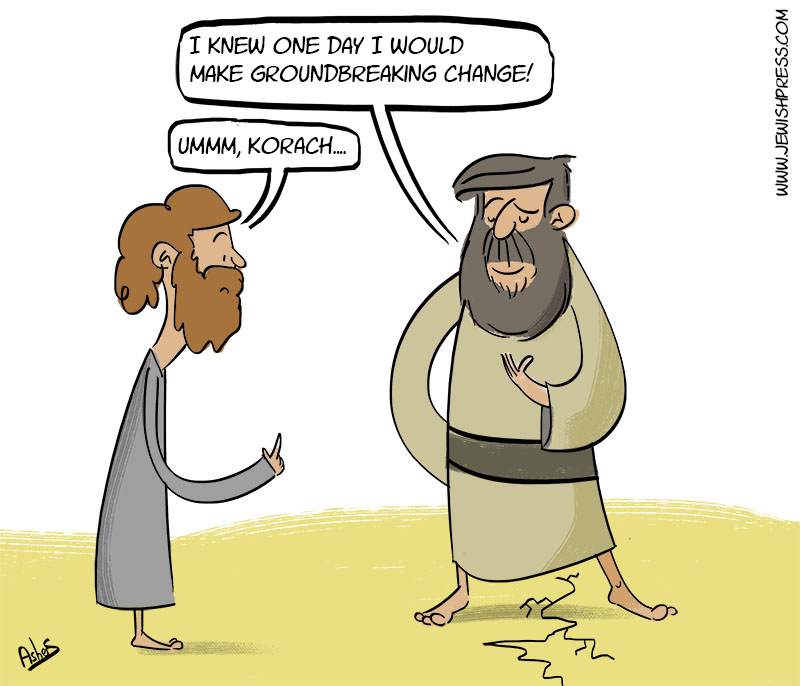With the story of Korah, the war against Moshe and the ingratitude expressed by the people receive new dimensions. Moshe’s leadership has been challenged before, but this time he was facing a well-organized mutiny, with those at the helm taking aim at him personally. It must have been very difficult for Moshe, who put his life on the line from the first moment he witnessed the suffering of the Israelites, and who had to endure exile and persecutions, to be accused that he wants to aggrandize himself at the expense of the people. His first response to that claim is spontaneous: “if you feel that you are chosen, bring your incense before HaShem tomorrow” (16:5-7), but he does not make it yet an official challenge. He first tries to reason with the Levites, reminding them the prestigious position they hold, but there is no record of their reaction, and it is possible that they ignored his plea.
Following that failed attempt to communicate with the Levites, Moshe calls the lay leaders of the rebellion, Datan and Aviram, but they are ready for him with poison-tipped arrows.
וַיִּשְׁלַ֣ח מֹשֶׁ֔ה לִקְרֹ֛א לְדָתָ֥ן וְלַאֲבִירָ֖ם בְּנֵ֣י אֱלִיאָ֑ב וַיֹּאמְר֖וּ לֹ֥א נַעֲלֶֽה. הַמְעַ֗ט כִּ֤י הֶֽעֱלִיתָ֙נוּ֙ מֵאֶ֨רֶץ זָבַ֤ת חָלָב֙ וּדְבַ֔שׁ לַהֲמִיתֵ֖נוּ בַּמִּדְבָּ֑ר, כִּֽי־תִשְׂתָּרֵ֥ר עָלֵי֖נוּ גַּם־הִשְׂתָּרֵֽר?
They said: we will not come up [to you, but also to the land]. Is it not enough that you took us out of the land of milk and honey to kill us in the desert, that you seek to establish yourself as our master?
They mock Moshe by saying that his efforts were futile. They were already living in the Promised Land, and he took them out of it by force. They remind him of his first encounter with the Israelites, when he tried to end the fight between two slaves and was told by them (Ex. 2:14):
מִ֣י שָֽׂמְךָ֞ לְאִ֨ישׁ שַׂ֤ר וְשֹׁפֵט֙ עָלֵ֔ינוּ? – Who has appointed you to be our master and judge?
The words שר and השתרר share the same Hebrew root, and so Datan and Aviram were telling Moshe that they are back where they started, and that nothing has changed. They continue blaming him:
אַ֡ף לֹ֣א אֶל־אֶרֶץ֩ זָבַ֨ת חָלָ֤ב וּדְבַשׁ֙ הֲבִ֣יאֹתָ֔נוּ וַתִּ֨תֶּן־לָ֔נוּ נַחֲלַ֖ת שָׂדֶ֣ה וָכָ֑רֶם! הַעֵינֵ֞י הָאֲנָשִׁ֥ים הָהֵ֛ם תְּנַקֵּ֖ר? לֹ֥א נַעֲלֶֽה!
You have not brought us to a land flowing with milk and honey, and you have not given us fields and vineyards! Are you trying to blind us? We will not come up!
It seems that they are just presenting the other side of the equation: you took us out of our Promised Land and did not bring us into your Promised Land, but Moshe understood their words in a completely different way. He became very angry and said: “I have not taken [even] a donkey from them [as a bribe] …” Moshe’s response demonstrates his brilliance as a leader and his genuine concern for the people. He got upset because he heard their subliminal message. Datan and Aviram were saying that they seek the well-being of the nation, but hinted that if Moshe will guarantee them estates with fields and vineyards, they will calm the mutiny. When they say, “you did not give us…” they mean “you have a chance to give us now”, and when they say, “are you trying to blind us?” they mean “oh yes, please blind us!” With bribe, that is, as the Torah says (Ex. 23:8) “bribe blinds justice”.
Moshe now sees through them, and through Korah and the “holy” rebels as well. He knows that they are heralding the nation’s cause only as a façade. They say that the whole community is holy and therefore no leader is needed, but they are making a cynical use of the frustration following the verdict of wandering in the desert for forty years, and they want to depose Moshe and become leaders themselves.
Moshe therefore returns to his initial suggestion, turning it into an official challenge. He asks Korah and all his followers, two hundred and fifty community leaders, to join Aaron in a ritual of incense-offering, meant to show who is God’s chosen one. Had Korah and his people been honest, they should have immediately rejected that test. They should have repeated their argument that there is no need for a leader, and suggest that they believe in populist leadership, in rotation, an orchestra without a conductor. But instead, they walk into his trap like a blind ant, and eagerly poise themselves early next morning, to see which one of them will be the one to depose the “dictator” and become the new dictator.
It was because of their hypocrisy, and not because he was personally offended, that Moshe demanded a spectacular punishment. He knew very well that while the nation could overcome disgruntled and even mean people, the hypocrites could cause total devastation.
The Talmud (Sotah 22:2) records, in that vein, an advice given by King Yannai (127-76 BCE) to his wife: Do not fear the pious or the non-pious, but rather the hypocrites who pretend to be pious.
It is interesting to note that King Yannai would probably have identified more with Korah than Moshe, since he has appointed himself High Priest.








Ohr HaChaim Yomi – Emor